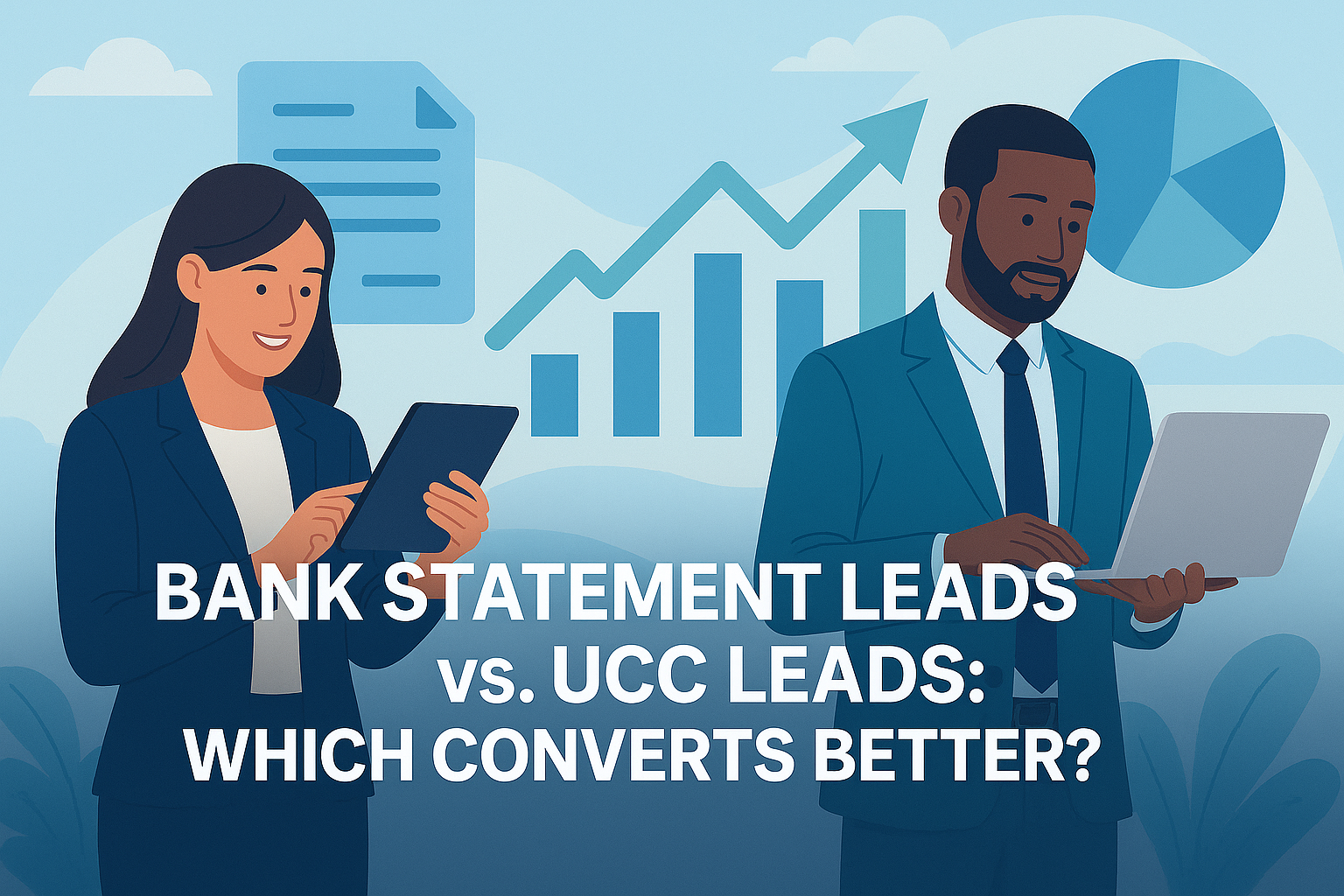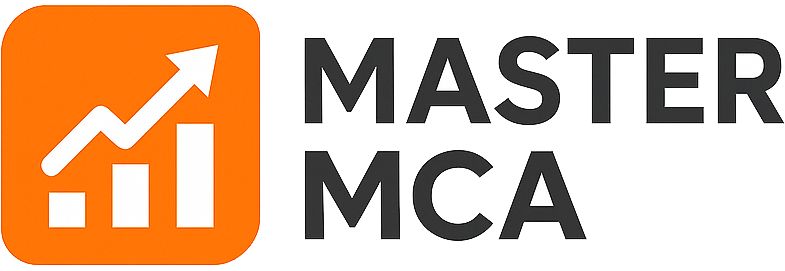
The Complete Guide to MCA Sales Conversion
Master the art of converting merchant cash advance leads into funded deals with proven sales strategies and scripts that top performers use to close more deals.
What You'll Learn in This Guide
- Proven sales processes that increase MCA conversion rates by 30-50%
- Effective discovery techniques to uncover funding needs and pain points
- Scripts and frameworks for handling common MCA objections
- Advanced closing techniques tailored for alternative funding sales
- Technology tools and metrics to optimize your sales performance
- Compliance considerations for ethical MCA sales practices
Table of Contents
- Introduction
- Understanding the MCA Sales Process
- Building Rapport and Trust
- Effective Discovery Techniques
- Presenting MCA Solutions
- Handling Objections
- Closing Techniques
- Follow-up and Nurturing
- Technology and Sales Tools
- Performance Metrics and KPIs
- Advanced Sales Strategies
- Compliance in MCA Sales
- Conclusion
- Frequently Asked Questions
Introduction
In the competitive world of merchant cash advance (MCA) sales, the difference between top performers and average salespeople often comes down to systematic approaches, proven techniques, and the ability to build genuine relationships with business owners. While generating quality leads is crucial, the real value lies in converting those leads into funded deals.
The MCA sales landscape in 2025 has evolved significantly, with more sophisticated prospects, increased competition, and higher expectations for professionalism and value. Business owners are more educated about funding options and often evaluate multiple providers before making decisions.
This comprehensive guide provides proven strategies, scripts, and techniques used by top-performing MCA sales professionals to consistently achieve conversion rates 30-50% above industry averages. Whether you're new to MCA sales or looking to refine your approach, these insights will help you close more deals and build lasting client relationships.
Understanding the MCA Sales Process
Successful MCA sales strategies follow a structured process that guides prospects from initial contact to funded deal. Understanding each stage and its objectives is crucial for consistent results:
The Complete MCA Sales Process from Lead to Funding
Stage 1: Initial Contact and Qualification
The first stage focuses on making a strong first impression, establishing credibility, and quickly qualifying the prospect's funding needs and timeline. Key objectives include:
- Confirming contact information and decision-maker status
- Understanding immediate funding needs and timeline
- Assessing basic qualification criteria (revenue, time in business)
- Scheduling a detailed discovery conversation
- Setting appropriate expectations for the process
Stage 2: Discovery and Needs Analysis
The discovery stage is where top performers differentiate themselves by uncovering not just funding needs, but the underlying business challenges and opportunities that drive those needs:
- Detailed financial analysis and cash flow assessment
- Understanding specific use of funds and expected ROI
- Identifying decision-making process and timeline
- Uncovering previous funding experiences and preferences
- Assessing competitive landscape and alternatives being considered
Stage 3: Solution Presentation
Based on discovery insights, successful sales professionals present customized funding solutions that address specific business needs rather than generic product features:
- Tailored funding recommendations based on cash flow and needs
- Clear explanation of terms, structure, and repayment process
- ROI analysis and business impact projections
- Comparison with alternatives and competitive advantages
- Timeline and next steps for moving forward
Stage 4: Objection Handling and Negotiation
Even well-qualified prospects will have concerns and objections. This stage focuses on addressing those concerns while maintaining momentum toward a decision:
- Identifying and addressing underlying concerns
- Providing additional information and reassurance
- Negotiating terms within acceptable parameters
- Overcoming competitive objections
- Maintaining urgency and decision timeline
Stage 5: Closing and Documentation
The closing stage involves securing commitment, completing documentation, and ensuring a smooth transition to funding:
- Securing verbal commitment and agreement to terms
- Completing application and documentation process
- Coordinating underwriting and approval process
- Managing expectations during processing
- Ensuring successful funding and client satisfaction
Success Tip: Top-performing MCA sales professionals spend 60% of their time in discovery and needs analysis, ensuring they fully understand the prospect's situation before presenting solutions. This investment in understanding leads to higher conversion rates and stronger client relationships.
Building Rapport and Trust
Trust is the foundation of successful MCA sales conversion. Business owners are entrusting you with sensitive financial information and making significant decisions that impact their company's future. Building genuine rapport and establishing credibility from the first interaction is crucial for long-term success.
First Impression Strategies
You have approximately 30 seconds to make a positive first impression. In the MCA industry, where prospects may have had negative experiences with aggressive salespeople, your approach must be professional, consultative, and value-focused.
Effective Opening Script Framework
Introduction: "Hi [Name], this is [Your Name] from [Company]. I understand you've been exploring funding options for your business."
Permission: "I have about 5 minutes to understand your situation and see if we might be able to help. Is now a good time to talk?"
Credibility: "We've helped over [X] businesses in [industry] secure the working capital they need to grow."
Transition: "Can you tell me a bit about what's driving your need for funding right now?"
This framework accomplishes several objectives: it's respectful of their time, establishes your expertise, and immediately focuses on their needs rather than your products.
Establishing Credibility
Credibility in MCA sales comes from demonstrating industry knowledge, sharing relevant experience, and showing genuine interest in the prospect's success. Key credibility builders include:
Industry Expertise
- Knowledge of industry-specific challenges
- Understanding of seasonal cash flow patterns
- Awareness of regulatory requirements
- Familiarity with industry terminology
Social Proof
- Relevant client success stories
- Industry certifications and credentials
- Company track record and statistics
- Third-party endorsements and reviews
When sharing success stories, focus on businesses similar to your prospect's situation. For example: "I recently worked with another restaurant owner who was looking to expand to a second location. We were able to provide the capital they needed, and they've since increased their revenue by 40%."
Understanding Business Needs
Genuine interest in understanding the prospect's business situation builds trust and provides the foundation for effective solution presentation. This goes beyond basic qualification to understand the business owner's goals, challenges, and motivations.
Trust-Building Questions
- "What's been the biggest challenge in growing your business this year?"
- "How has the current economic environment affected your industry?"
- "What would successful funding look like for your business?"
- "What concerns do you have about taking on additional funding?"
- "How do you typically make important financial decisions for your business?"
These questions demonstrate that you're interested in their success, not just making a sale. They also provide valuable insights that help you position your solution more effectively.
Rapport Building Tip: Mirror your prospect's communication style and pace. If they're direct and business-focused, match that energy. If they prefer to build relationships first, invest time in getting to know them personally. Adapting your style shows emotional intelligence and builds stronger connections.
Effective Discovery Techniques
The discovery phase is where deals are won or lost. Effective discovery goes beyond basic qualification to uncover the prospect's true motivations, decision-making process, and success criteria. This information becomes the foundation for presenting compelling solutions and handling objections.
The BANT-Plus Framework
While traditional BANT (Budget, Authority, Need, Timeline) qualification remains important, modern MCA sales requires additional discovery elements:
Traditional BANT
- Budget: Funding amount needed
- Authority: Decision-making power
- Need: Specific funding requirements
- Timeline: When funding is needed
Enhanced Discovery
- Pain: Underlying business challenges
- Impact: Consequences of not funding
- Vision: Success outcomes and goals
- Process: How decisions are made
Strategic Discovery Questions
The right questions uncover information that helps you position your solution as the best choice. Here are proven question frameworks organized by discovery objective:
Financial Situation Discovery
- "What's your average monthly revenue over the past 6 months?"
- "How consistent is your cash flow throughout the month?"
- "Do you have any seasonal patterns in your business?"
- "What percentage of your revenue comes from credit card sales?"
- "Are you currently making payments on any existing funding?"
Use of Funds Discovery
- "What specific business need is driving your search for funding?"
- "How will this funding help you achieve your business goals?"
- "What's the expected return on this investment?"
- "What happens if you don't get the funding you need?"
- "Have you considered alternative ways to address this need?"
Decision Process Discovery
- "Who else is involved in making this funding decision?"
- "What factors are most important in choosing a funding partner?"
- "What concerns do you have about merchant cash advances?"
- "Are you considering other funding options besides MCA?"
- "What would need to happen for you to move forward this week?"
Competitive Intelligence Discovery
- "Have you worked with MCA providers before? How was that experience?"
- "What other funding sources are you exploring?"
- "What would make one provider stand out from another?"
- "What's been your biggest frustration in the funding process so far?"
- "If you could design the perfect funding experience, what would it look like?"
Active Listening Techniques
Effective discovery requires exceptional listening skills. Top performers use these techniques to gather deeper insights:
- Reflective Listening: "So if I understand correctly, your main concern is..."
- Clarifying Questions: "Can you help me understand what you mean by..."
- Emotional Labeling: "It sounds like this situation is causing some stress..."
- Summarizing: "Let me make sure I have this right..."
- Probing Deeper: "Tell me more about..."
Effective Discovery Conversation Flow for MCA Sales
Download Our MCA Sales Discovery Toolkit
Get our comprehensive discovery question bank, qualification checklists, and conversation guides used by top MCA sales professionals.
Download Free ToolkitPresenting MCA Solutions
Once you've completed thorough discovery, the solution presentation becomes a natural extension of the conversation. Rather than pitching generic products, you're presenting customized solutions that address specific needs and challenges uncovered during discovery.
The Solution Presentation Framework
Effective MCA presentations follow a structured approach that connects discovery insights to specific benefits and outcomes:
Presentation Structure
- Recap Discovery: Summarize their situation and needs
- Present Solution: Introduce your recommended approach
- Explain Benefits: Connect features to their specific needs
- Address Concerns: Proactively handle likely objections
- Show Proof: Provide relevant examples and testimonials
- Outline Next Steps: Clear path to moving forward
Customizing Your Presentation
Generic presentations fail in today's competitive environment. Successful sales professionals tailor their presentations based on discovery insights:
For Growth-Focused Businesses
- Emphasize speed and flexibility
- Focus on ROI and growth potential
- Highlight scalability of funding
- Share expansion success stories
For Cash Flow Challenges
- Stress immediate availability
- Explain flexible repayment structure
- Address cash flow concerns
- Provide stability examples
Explaining MCA Structure Effectively
Many prospects don't fully understand how merchant cash advances work. Clear explanation of the structure builds confidence and reduces objections:
MCA Explanation Script
"Let me explain how this works in simple terms. We're purchasing a portion of your future credit card sales at a discount."
"For example, if we advance you $50,000, we might purchase $60,000 of your future sales. That $10,000 difference is our fee for providing the capital upfront."
"Instead of fixed monthly payments, we collect a small percentage of your daily credit card sales. When sales are good, we collect more. When they're slower, we collect less."
"This means the repayment automatically adjusts to your cash flow, which is especially helpful for businesses with seasonal patterns."
Using Visual Aids and Examples
Visual presentations help prospects understand complex concepts and see the impact of funding on their business:
- Cash flow projections showing before and after funding
- ROI calculations for their specific use of funds
- Comparison charts showing MCA vs. traditional loans
- Timeline graphics showing speed to funding
- Industry-specific case studies and examples
Presentation Tip: Always present multiple funding options when possible. Giving prospects choices increases their sense of control and often leads to selecting a larger advance amount. Frame options as "good, better, best" rather than just different amounts.
Handling Objections
Objections are a natural part of the sales process and often indicate genuine interest. The key to successful objection handling is preparation, empathy, and focusing on the underlying concerns rather than just the surface objection.
Common MCA Objections
Understanding the most frequent objections and their underlying causes helps you prepare effective responses:
"The cost is too high"
Underlying concern: Fear of financial burden, lack of understanding of value proposition
"I need to think about it"
Underlying concern: Uncertainty, need for more information, or lack of urgency
"I want to shop around"
Underlying concern: Fear of making wrong decision, desire for best deal
"Daily payments will hurt my cash flow"
Underlying concern: Misunderstanding of payment structure, cash flow anxiety
"I've heard bad things about MCAs"
Underlying concern: Past negative experiences, industry reputation concerns
Objection Response Framework
The LEARN framework provides a systematic approach to handling objections while maintaining rapport and moving toward resolution:
LEARN Framework
- Listen: Allow them to fully express their concern
- Empathize: Acknowledge their feelings and validate their concern
- Ask: Probe to understand the underlying issue
- Respond: Address the specific concern with relevant information
- Navigate: Guide the conversation back to moving forward
Example: "The cost is too high"
Listen: "I understand you're concerned about the cost..."
Empathize: "That's a completely reasonable concern. Every business owner needs to carefully evaluate any financial decision."
Ask: "Help me understand - are you comparing this to a bank loan, or are you concerned about the impact on your cash flow?"
Respond: "Let me show you how this breaks down on a daily basis and the ROI you can expect..."
Navigate: "Given the growth opportunity you described, what would you need to see to feel comfortable moving forward?"
Handling Price and Cost Objections
Price objections are the most common in MCA sales. Effective responses focus on value, ROI, and cost of inaction rather than just defending the price:
Cost Per Day Technique
"I understand $10,000 sounds like a lot, but let's break this down. Over 12 months, that's about $27 per day. For most businesses, that's less than the cost of a few cups of coffee. And you're getting $50,000 in working capital that can generate much more than $27 per day in additional revenue."
Opportunity Cost Technique
"You mentioned this inventory purchase could increase your revenue by 30%. Let's calculate what it costs you NOT to have this funding. If you wait three months to save up the money, how much revenue are you losing during that time?"
Value Comparison Technique
"Yes, this costs more than a bank loan, but it's also available in 24 hours instead of 3 months, doesn't require collateral, and adjusts to your cash flow. When you factor in the speed and flexibility, many business owners find it's actually the most cost-effective option for their situation."
Objection Handling Warning: Never argue with prospects or dismiss their concerns. Even if an objection seems unreasonable, it's real to them. Always acknowledge their perspective before providing additional information or alternative viewpoints.
Closing Techniques
Effective closing in MCA sales isn't about pressure tactics or manipulation. It's about helping qualified prospects make decisions that benefit their business. The best closers create urgency around the business opportunity, not the funding offer.
The Assumptive Close
When you've built strong rapport, completed thorough discovery, and presented a compelling solution, the assumptive close feels natural to both you and the prospect:
Assumptive Close Examples
- "Based on everything we've discussed, the $75,000 advance seems like the right fit. Let's get the paperwork started so we can have funds in your account by Thursday."
- "I'll need your bank statements from the last 3 months to get this process moving. Can you email those to me today?"
- "The next step is completing the application. Do you have about 10 minutes now, or would you prefer to do it after lunch?"
The Alternative Close
Offering choices between two positive options helps prospects feel in control while moving toward a decision:
Alternative Close Examples
- "Would you prefer the $50,000 advance with the lower factor rate, or the $75,000 that gives you more working capital for the expansion?"
- "Do you want to start with the application now, or would you prefer I send you the paperwork to review first?"
- "Should we target funding for this week or early next week?"
The Urgency Close
Creating appropriate urgency around business opportunities (not artificial sales pressure) motivates action:
Urgency Close Examples
- "You mentioned the equipment sale ends Friday. If we get your application in today, we can have funding by Thursday to take advantage of that discount."
- "With the busy season starting next month, having this working capital in place now will let you stock up and maximize those sales opportunities."
- "The longer we wait, the more revenue you're potentially leaving on the table. What would need to happen for us to move forward today?"
The Summary Close
Summarizing the key benefits and agreements reached during the conversation reinforces the value proposition:
Summary Close Example
"Let me make sure I understand what we've agreed on:
- You need $60,000 to purchase inventory for the holiday season
- You want funding in place by next Friday
- The daily payment structure works better for your cash flow than a fixed monthly payment
- You're comfortable with the 1.25 factor rate given the speed and flexibility
Is that accurate? Great, let's get the application completed so we can meet your timeline."
Handling Closing Resistance
When prospects resist closing, it usually indicates unresolved concerns or missing information:
Common Resistance Signals
- "I need to think about it"
- "Let me discuss with my partner"
- "I want to shop around first"
- "This is moving too fast"
- "I'm not ready to decide today"
Response Strategies
- Identify specific concerns
- Provide additional information
- Offer trial or pilot programs
- Create appropriate urgency
- Schedule follow-up commitment
Effectiveness of Different Closing Techniques in MCA Sales (2025 Data)
Follow-up and Nurturing
Not every qualified prospect will be ready to move forward immediately. Effective follow-up and nurturing systems ensure you stay top-of-mind when they are ready to make a decision. In the MCA industry, persistence and value-added follow-up often make the difference between winning and losing deals.
The Follow-up Framework
Systematic follow-up requires a structured approach that provides value in each interaction while maintaining momentum toward a decision:
7-Touch Follow-up Sequence
- Immediate (same day): Thank you email with proposal summary
- Day 2: Phone call to address any questions
- Day 4: Email with relevant case study or industry insight
- Day 7: Phone call with additional funding options
- Day 10: Email with market update or business tip
- Day 14: Phone call to check on business situation
- Day 21: Email with new opportunity or limited-time offer
Value-Added Follow-up Content
Each follow-up interaction should provide value beyond just checking in. This approach builds relationships and positions you as a trusted advisor:
Educational Content
- Industry trend reports
- Cash flow management tips
- Business growth strategies
- Seasonal planning guides
- Regulatory updates
Social Proof
- Recent client success stories
- Industry testimonials
- Case studies with ROI data
- Media mentions and awards
- Third-party endorsements
Multi-Channel Follow-up Strategy
Different prospects prefer different communication channels. A multi-channel approach increases your chances of staying connected:
Phone Follow-up
Best for urgent matters, complex discussions, and building personal relationships. Leave valuable voicemails that provide information rather than just requesting callbacks.
Email Follow-up
Ideal for sharing documents, detailed information, and maintaining regular contact. Use compelling subject lines and mobile-optimized formatting.
Text/SMS Follow-up
Effective for quick check-ins, appointment reminders, and urgent communications. Keep messages brief and professional.
Social Media Engagement
LinkedIn connections, commenting on posts, and sharing relevant content helps maintain visibility and build relationships.
Nurturing Long-term Prospects
Some prospects may not be ready for funding for months or even years. Long-term nurturing systems ensure you're positioned to win when they are ready:
- Monthly newsletter with industry insights and business tips
- Quarterly check-ins to assess changing business needs
- Holiday and milestone acknowledgments
- Invitations to webinars and educational events
- Referral opportunities and introductions
Follow-up Success Metric: Top-performing MCA sales professionals convert 15-25% of their follow-up prospects within 6 months, compared to 3-5% for those without systematic follow-up
Technology and Sales Tools
Modern MCA sales relies heavily on technology to streamline processes, improve communication, and optimize performance. Sales professionals who leverage the right tools gain a significant competitive advantage.
CRM Systems for Lead Management
Customer Relationship Management (CRM) systems are essential for organizing leads, tracking interactions, and managing the sales pipeline:
- Centralized lead database
- Automated task reminders
- Sales pipeline visualization
- Reporting and analytics
- Integration with other tools
Automated Follow-up Sequences
Automated email and SMS sequences ensure consistent follow-up without manual effort:
- Pre-written email templates
- Scheduled SMS reminders
- Personalized messaging
- A/B testing capabilities
- Performance tracking
Video Conferencing for Remote Presentations
Video conferencing tools enable remote presentations and build stronger relationships:
- Screen sharing capabilities
- Interactive whiteboards
- Recording features
- Integration with CRM systems
- Mobile accessibility
E-Signature Platforms for Quick Document Execution
E-signature platforms streamline the documentation process and accelerate deal closing:
- Secure document signing
- Automated reminders
- Audit trails
- Integration with CRM systems
- Mobile accessibility
Analytics Tools for Performance Tracking
Analytics tools provide insights into sales performance and identify areas for improvement:
- Conversion rate tracking
- Lead source analysis
- Sales cycle length
- Deal size analysis
- Team performance metrics
Technology Tip: Invest in training your sales team on how to effectively use these tools. Technology is only as effective as the people using it.
Performance Metrics and KPIs
Tracking key performance indicators (KPIs) is essential for measuring success and identifying areas for improvement in MCA sales.
Key Performance Indicators (KPIs)
Here are some of the most important KPIs to track in MCA sales:
Lead Generation Metrics
- Number of leads generated
- Lead source
- Lead quality score
- Cost per lead
Sales Conversion Metrics
- Conversion rate
- Sales cycle length
- Average deal size
- Close ratio
Sales Activity Metrics
- Number of calls made
- Number of emails sent
- Number of meetings scheduled
- Number of demos given
Customer Satisfaction Metrics
- Customer satisfaction score
- Customer retention rate
- Referral rate
- Net Promoter Score (NPS)
Setting Performance Goals
Setting clear and measurable performance goals is essential for driving success:
- Set SMART goals (Specific, Measurable, Achievable, Relevant, Time-bound)
- Track progress regularly
- Provide feedback and coaching
- Reward top performers
- Adjust goals as needed
Example MCA Sales Performance Dashboard
Advanced Sales Strategies
Top-performing MCA sales professionals use advanced strategies to differentiate themselves and close more deals.
Value-Based Selling
Focus on the value you provide to the customer, not just the price of the product:
- Understand the customer's needs
- Quantify the benefits of your solution
- Differentiate yourself from the competition
- Build strong relationships
- Focus on long-term value
Consultative Selling
Act as a consultant to the customer, not just a salesperson:
- Ask probing questions
- Listen actively
- Provide expert advice
- Tailor your solution to their needs
- Build trust and credibility
Strategic Partnerships
Partner with other businesses to generate leads and expand your reach:
- Identify complementary businesses
- Develop mutually beneficial relationships
- Share leads and resources
- Co-market your products and services
- Attend industry events together
Referral Programs
Encourage existing customers to refer new customers:
- Offer incentives for referrals
- Make it easy for customers to refer
- Track referrals and reward customers
- Promote your referral program
- Thank customers for referrals
Account-Based Marketing (ABM)
Focus your marketing efforts on specific high-value accounts:
- Identify target accounts
- Research their needs and challenges
- Develop personalized marketing campaigns
- Engage with key decision-makers
- Measure results and adjust your strategy
Compliance in MCA Sales
Compliance is critical in MCA sales to protect both the business and the customer.
Truth in Lending Act (TILA)
While MCAs are not technically loans, it's important to be transparent about the terms and conditions of the agreement.
- Disclose all fees and charges
- Explain the repayment schedule
- Provide a clear and concise agreement
- Avoid misleading or deceptive practices
Fair Credit Reporting Act (FCRA)
If you are using credit reports to evaluate customers, you must comply with the FCRA.
- Obtain consent before pulling credit reports
- Use credit reports for permissible purposes only
- Provide adverse action notices
- Protect the confidentiality of credit information
State and Local Regulations
Be aware of state and local regulations that may apply to MCA sales.
- Licensing requirements
- Usury laws
- Disclosure requirements
- Consumer protection laws
Best Practices for Compliance
Follow these best practices to ensure compliance in MCA sales:
- Train your sales team on compliance requirements
- Implement a compliance program
- Monitor sales activities for compliance
- Conduct regular audits
- Seek legal advice
Conclusion
Mastering MCA sales conversion requires a combination of proven strategies, effective techniques, and a commitment to building genuine relationships with business owners. By understanding the MCA sales process, building rapport and trust, using effective discovery techniques, presenting customized solutions, handling objections effectively, closing deals with confidence, and following up consistently, you can achieve conversion rates 30-50% above industry averages.
In the evolving landscape of MCA sales in 2025, continuous learning, adaptation, and a focus on providing value are essential for long-term success. By embracing technology, tracking performance metrics, and staying compliant with regulations, you can build a thriving MCA sales career and help businesses access the funding they need to grow and succeed.
Frequently Asked Questions
Related Guides

The Ultimate Guide to MCA Leads in 2025
Discover the most effective strategies for generating, qualifying, and converting high-quality merchant cash advance leads in today's competitive market.

UCC Filings: The Gold Standard for MCA Lead Generation
Learn why UCC filings remain the most reliable source of high-intent prospects for merchant cash advance providers.

Advanced MCA Lead Generation Strategies for 2025
Explore cutting-edge techniques and innovative approaches to generate high-quality merchant cash advance leads.
Boost Your MCA Sales Performance
Get access to our proven sales training materials and conversion optimization tools. Complete the form below to discuss your sales training needs.
MCA Sales Conversion Toolkit
Download our complete sales toolkit with scripts, objection handling guides, and closing techniques used by top MCA sales professionals.
- Proven sales scripts and conversation starters
- Objection handling response templates
- Performance tracking spreadsheets

